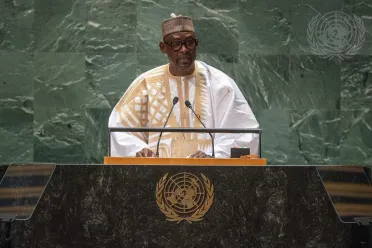Statement
Statement summary
ABDOULAYE DIOP, Minister for Foreign Affairs and International Cooperation of Mali, also speaking on behalf of Abdourahamane Tchiani, President of the National Council for the Safeguard of the Homeland of Niger — “who has been prevented from speaking here” — said that peace and security remain priorities for the people of Mali and the Sahel. He denounced certain Powers’ interference, which continues to facilitate the criminal activities of terrorist groups in that country and region. On 15 August 2022, the Government alerted the Security Council to France’s hostile activities and — rather than ceasing such actions — that permanent Council member continued with full impunity. He also said that, after being present in Mali for 10 years, the international response to the country’s security challenges was not “commensurate to the threats”. Further, the expectations of the people — expressed by national authorities — were often ignored, and the United Nations Multidimensional Integrated Stabilization Mission in Mali (MINUSMA) has not been able to help re-establish national territorial control.
Rather, he reported that the security situation has only deteriorated, and that the insecurity previously contained to Mali’s north when the Mission was deployed in 2013 has now reached its south and centre. It “became unacceptable”, he said, for the Government to allow MINUSMA to aggravate tensions between communities through the instrumentalization of human rights for political ends. Therefore, in June 2023, the Government requested the Mission’s withdrawal, and is now working towards such exit by 31 December pursuant to Security Council resolution 2690 (2023). The Government “does not envisage extending this deadline”, he stated, while adding that the Mission’s withdrawal does not mean the end of cooperation between Mali and the United Nations. He underscored, however, that — in the current geopolitical context — “Mali does not want to be a theatre of confrontation or competition for foreign geopolitical interests”. He also rejected the policy of certain States to “exercise neo-colonial dominion and subject other peoples and nations”.
He went on to state that the Government is “closely tracking the situation in Niger”, denouncing the imposition of sanctions and coercive measures against another nation — particularly when they are illegal and inhumane, as in the case of ECOWAS (Economic Community of West African States) sanctions against Niger. Mali also opposes any military intervention by ECOWAS, which would have disastrous consequences for Niger and the region. “We will not stand idly by,” he stressed, urging that past errors not be repeated. On that, he said that NATO’s 2011 intervention in Libya — authorized by the Council — violently destabilized that country and the region, serving as the “origin” of terrorism’s expansion through the Sahel. He therefore called on the international community to “avoid reproducing in Niger the errors committed in Libya”, also calling for changes in global economic, financial and political governance to craft fair conditions for Africa’s participation in multilateral institutions. Mali is committed to a multilateralism “where each nation counts”, he added.
Full statement
Read the full statement, in PDF format.
Photo

Previous sessions
Access the statements from previous sessions.
